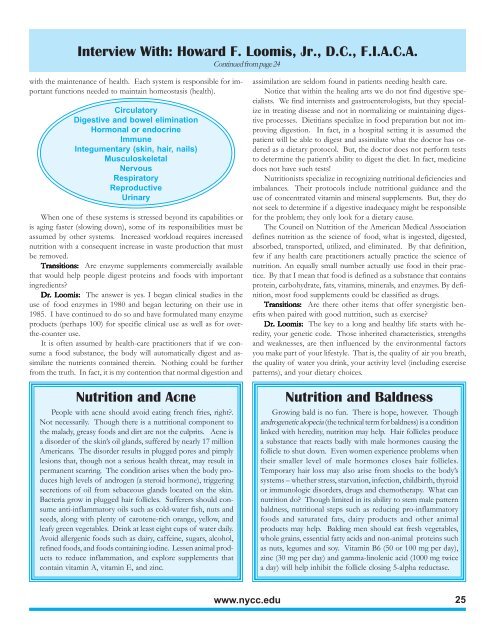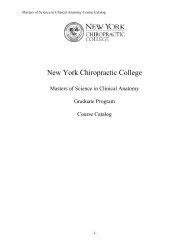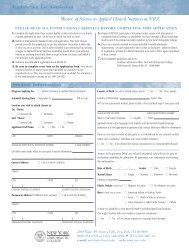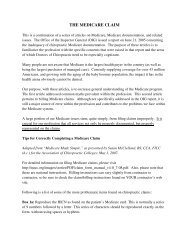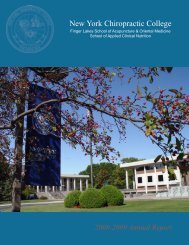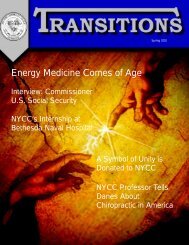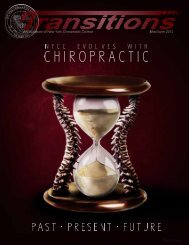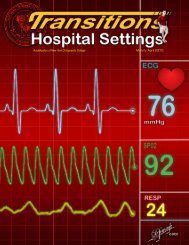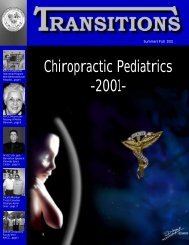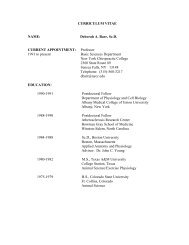2502 NYCC TRANS FINAL2 - New York Chiropractic College
2502 NYCC TRANS FINAL2 - New York Chiropractic College
2502 NYCC TRANS FINAL2 - New York Chiropractic College
Create successful ePaper yourself
Turn your PDF publications into a flip-book with our unique Google optimized e-Paper software.
Interview With: Howard F. Loomis, Jr., D.C., F.I.A.C.A.<br />
Continued from page 24<br />
with the maintenance of health. Each system is responsible for important<br />
functions needed to maintain homeostasis (health).<br />
Circulatory<br />
Digestive and bowel elimination<br />
Hormonal or endocrine<br />
Immune<br />
Integumentary (skin, hair, nails)<br />
Musculoskeletal<br />
Nervous<br />
Respiratory<br />
Reproductive<br />
Urinary<br />
When one of these systems is stressed beyond its capabilities or<br />
is aging faster (slowing down), some of its responsibilities must be<br />
assumed by other systems. Increased workload requires increased<br />
nutrition with a consequent increase in waste production that must<br />
be removed.<br />
Transitions: Are enzyme supplements commercially available<br />
that would help people digest proteins and foods with important<br />
ingredients?<br />
Dr. Loomis: The answer is yes. I began clinical studies in the<br />
use of food enzymes in 1980 and began lecturing on their use in<br />
1985. I have continued to do so and have formulated many enzyme<br />
products (perhaps 100) for specific clinical use as well as for overthe-counter<br />
use.<br />
It is often assumed by health-care practitioners that if we consume<br />
a food substance, the body will automatically digest and assimilate<br />
the nutrients contained therein. Nothing could be further<br />
from the truth. In fact, it is my contention that normal digestion and<br />
Nutrition and Acne<br />
People with acne should avoid eating french fries, right?.<br />
Not necessarily. Though there is a nutritional component to<br />
the malady, greasy foods and dirt are not the culprits. Acne is<br />
a disorder of the skin’s oil glands, suffered by nearly 17 million<br />
Americans. The disorder results in plugged pores and pimply<br />
lesions that, though not a serious health threat, may result in<br />
permanent scarring. The condition arises when the body produces<br />
high levels of androgen (a steroid hormone), triggering<br />
secretions of oil from sebaceous glands located on the skin.<br />
Bacteria grow in plugged hair follicles. Sufferers should consume<br />
anti-inflammatory oils such as cold-water fish, nuts and<br />
seeds, along with plenty of carotene-rich orange, yellow, and<br />
leafy green vegetables. Drink at least eight cups of water daily.<br />
Avoid allergenic foods such as dairy, caffeine, sugars, alcohol,<br />
refined foods, and foods containing iodine. Lessen animal products<br />
to reduce inflammation, and explore supplements that<br />
contain vitamin A, vitamin E, and zinc.<br />
assimilation are seldom found in patients needing health care.<br />
Notice that within the healing arts we do not find digestive specialists.<br />
We find internists and gastroenterologists, but they specialize<br />
in treating disease and not in normalizing or maintaining digestive<br />
processes. Dietitians specialize in food preparation but not improving<br />
digestion. In fact, in a hospital setting it is assumed the<br />
patient will be able to digest and assimilate what the doctor has ordered<br />
as a dietary protocol. But, the doctor does not perform tests<br />
to determine the patient’s ability to digest the diet. In fact, medicine<br />
does not have such tests!<br />
Nutritionists specialize in recognizing nutritional deficiencies and<br />
imbalances. Their protocols include nutritional guidance and the<br />
use of concentrated vitamin and mineral supplements. But, they do<br />
not seek to determine if a digestive inadequacy might be responsible<br />
for the problem; they only look for a dietary cause.<br />
The Council on Nutrition of the American Medical Association<br />
defines nutrition as the science of food, what is ingested, digested,<br />
absorbed, transported, utilized, and eliminated. By that definition,<br />
few if any health care practitioners actually practice the science of<br />
nutrition. An equally small number actually use food in their practice.<br />
By that I mean that food is defined as a substance that contains<br />
protein, carbohydrate, fats, vitamins, minerals, and enzymes. By definition,<br />
most food supplements could be classified as drugs.<br />
Transitions: Are there other items that offer synergistic benefits<br />
when paired with good nutrition, such as exercise?<br />
Dr. Loomis: The key to a long and healthy life starts with heredity,<br />
your genetic code. Those inherited characteristics, strengths<br />
and weaknesses, are then influenced by the environmental factors<br />
you make part of your lifestyle. That is, the quality of air you breath,<br />
the quality of water you drink, your activity level (including exercise<br />
patterns), and your dietary choices.<br />
Nutrition and Baldness<br />
Growing bald is no fun. There is hope, however. Though<br />
androgenetic alopecia (the technical term for baldness) is a condition<br />
linked with heredity, nutrition may help. Hair follicles produce<br />
a substance that reacts badly with male hormones causing the<br />
follicle to shut down. Even women experience problems when<br />
their smaller level of male hormones closes hair follicles.<br />
Temporary hair loss may also arise from shocks to the body’s<br />
systems – whether stress, starvation, infection, childbirth, thyroid<br />
or immunologic disorders, drugs and chemotherapy. What can<br />
nutrition do? Though limited in its ability to stem male pattern<br />
baldness, nutritional steps such as reducing pro-inflammatory<br />
foods and saturated fats, dairy products and other animal<br />
products may help. Balding men should eat fresh vegetables,<br />
whole grains, essential fatty acids and non-animal proteins such<br />
as nuts, legumes and soy. Vitamin B6 (50 or 100 mg per day),<br />
zinc (30 mg per day) and gamma-linolenic acid (1000 mg twice<br />
a day) will help inhibit the follicle closing 5-alpha reductase.<br />
www.nycc.edu<br />
25


